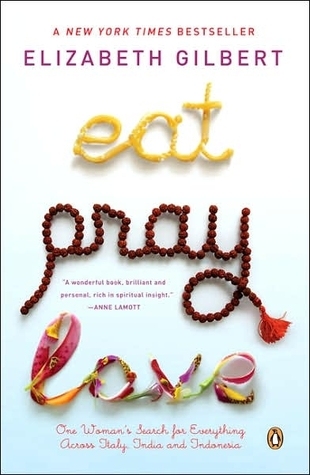Elizabeth Gilbert has already proven herself to be a multi-talented writer of short stories (Pilgrims), a novel (Stern Men), and nonfiction (The Last American Man). Now, she has written a spiritual memoir that is creatively constructed in three parts, each consisting of 36 short segments, matching the 108 beads on the traditional Indian prayer necklace.
Gilbert was 31 when her marriage and prosperous lifestyle crashed and burned in a grueling divorce, followed by a passionate love affair with a guy named David that ended in heartbreak. No wonder she snapped up the opportunity to fly to Bali to write a story about Yoga vacations. There she met Ketut, a ninth-generation Indonesian medicine man who told her that she worried too much and was desperately in need of something different in her life. Gilbert decided to spend a year abroad — four months each in Italy, India, and Bali. This odyssey was funded by her publisher who was looking forward to seeing what she would write about this very unusual spiritual pilgrimage.
Gilbert chose Italy because of the happiness she felt studying Italian. In Rome, she meets Luca Spaghetti, who becomes a friend and introduces her to the pleasures of doing nothing, although she does suffer some Puritan guilt over enjoying the delights of the flesh. Ten days into the trip, Gilbert allows loneliness and depression to bring her down; she plunges into sadness over the end of her affair with David. But her old travel talent for making friends with anybody comes in handy during six weeks of traveling to different Italian cities. She gains 23 pounds, but doesn't allow that to faze her; after all, pleasure must be savored wherever it's found.
The 36 segments in the second part of the book take place in an ashram in a remote rural village in India. There are never more than a few hundred people in residence because the guru is away. Gilbert spends her days in meditation and contemplation. Her work assignment is to scrub the temple floors. Already familiar with the yogic path, Gilbert knows that discontentment, according to Hinduism, is due to our belief that "our limited limited little egos constitute our entire whole nature."
Gilbert's sociability comes to the fore again, and she is befriended by Richard, a Texan who renovates old houses in Austin. He nicknames her "Groceries" and helps her begin the inner work that she needs to do regarding David and her messed-up love life. The closer she draws to God, the more she realizes that one of her major obstacles is the inability to let go. Witnessing her thoughts, Gilbert is distressed by her monkey mind and her fear of surrendering to the dark: "I got to thinking about how much time I spend in my life crashing around like a great gasping fish, either squirming away from some uncomfortable distress or flopping hungrily toward ever more pleasure." After she decides to stop being the ashram social bunny, she is given a new work assignment of taking care of the guests while maintaining silence. The lesson sinks in: surrender is the right mode on her path of devotion.
Gilbert goes to the tiny Hindu island of Bali for the final leg of her spiritual odyssey. She wants to find some balance between worldly pleasure (Italy) and spiritual devotion (India) — quite a tricky feat and especially hard for Americans who usually swing between extremes. "The Balinese are global masters of balance," she writes, "the people for whom the maintenance of perfect equilibrium is an art, a science and a religion." She reconnects with Ketut, the medicine man she met two years earlier, and they develop a fine relationship. Gilbert also meets a medicine woman who proves to be a very important person in her own emotional education as she tries to "hold steady in this chaotic world."
